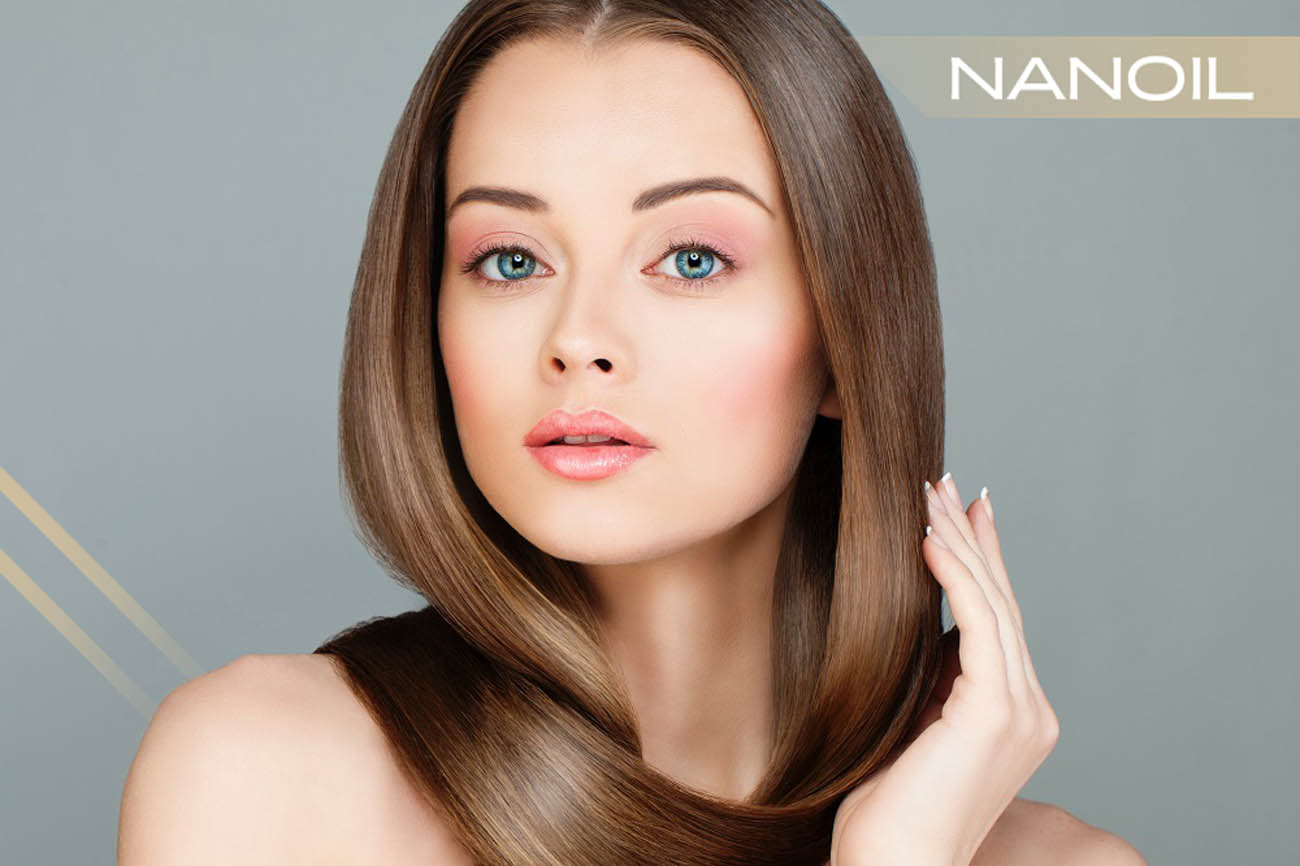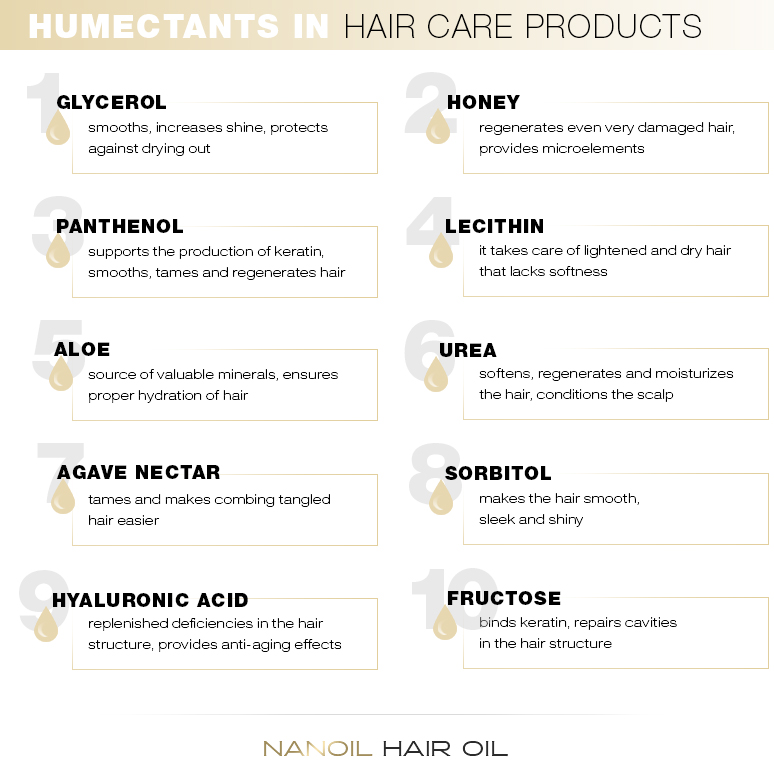- NANOIL Products
- Oils
- Face serums
- Hair masks
- Shampoos
- Hair conditioners
- Hair styling
- Care
- Hair Porosity Test
- Blog
- Contact

Water is the source of life, including the life of hair. Without water, every hair care routine is going to end up in failure.
Without enough hydration, hair is brittle and dry, especially on ends. In summer time, hair loses water twice as fast because of the sunlight that causes damage and dryness. That’s why humectants – hygroscopic molecules that bind water in cells – matter so much in hair care. Try to picture it – a dose of humectants is for hair like a glass of water for us on hot days.
You should or even must remember to moisturise your hair yet not to use too many humectants. The excess of these hygroscopic substances can bring the adverse effect; it often happens when the air humidity increases. Hair absorbs the tiny molecules too quickly and intensively so it gets frizzy and dull.
So-called dew point is very important to hair – water vapour changes its matter of state (forms liquid water – dew). Due to the temp and weather conditions, hair cuticle scales open and absorb moist molecules, causing frizz and dullness. Emollients effectively protect hair from moist excess, including natural oils – unbeatable in hair care. Thanks to oils, we can keep the balance of humectants, proteins and emollients delivered to our hair. The regular hair oil treatment creates a microscopic layer on hair surface – it doesn’t only keep the right level of humectants but also shields hair against getting too much humidity inside.

You can provide your hair with humectants, buying hair moisturising substances. You can apply them separately, mix them with oils or get ready-made products (balms, masks) that include the right quantity of humectants. Most common moisturising substances in hair cosmetics:
Glycerol – a trihydric alcohol, so-called good alcohol that has moisturising and smoothing properties. Glycerol is common in hair care conditioners and masks because it intensively moisturises extremely dry hair, instantly enhancing its looks.
Honey – it’s famous for both moisturising and regenerating benefits. Honey is mostly recommended for brittle and damaged hair, delivering softness and smoothness. Used regularly, it keeps hair from splitting. Thanks to a high concentration of minerals, honey nourishes over-processed hair. It also works for fair hair, taking care of its colour.
Panthenol – also known as pro-vitamin B5. It moisturises and smooths hair as well as increases shine and facilitates combing, boosting hair volume. Thanks to conditioning properties, panthenol is one of the most valuable humectants included in hair products. One more thing worth remembering – panthenol speeds up hair repair and boosts production of keratin (natural building block of hair).
Lecithin – the main ingredient of the cell membrane. It’s an amazing moisturising substance that eases the absorption of other active ingredients that can be delivered to the inside of hair (that’s why lecithin is so popular in hair masks and conditioners). Moreover, lecithin makes hair soft and bouncy. It is great for bleached or permed hair.
Aloe – it’s both a humectant and a treasure house of mineral ingredients: calcium, sodium, magnesium, iron, potassium, chromium and zinc. Aloe juice is a great component of hair balms and masks because it contains vitamins A, C, E. You can apply it with natural oils to gift hair with the right hydration and shine.
Urea – sometimes called ‘snow for hair’ (its tiny crystals look like snow flakes). Obviously, it has moisturising power but urea also delivers softness and hair repair. Few people know that urea provides a great scalp care – it doesn’t only moisturise but also helps fight dandruff, psoriasis and eczema. Urea brings nice gloss and is common in masks for colour-treated hair.
Agave nectar – common sugar substitute. This sweet nectar – similarly to honey – works as a strong humectant. Additionally, it helps detangle hair and delivers an intensive hair care, boosting shine, bounce and elasticity.
Sorbitol – a colourless and hygroscopic liquid that resembles a thick syrup. Similarly to all humectants, it gifts hair with moisture. Sorbitol also gives a ‘slide’ to all substances it is included in. As a result, hair masks or conditioners easily spread on the hair surface. If you nourish hair with sorbitol, it will be incredibly smooth. This humectant dissolves in water, which makes the application easier and keeps you from applying too much. Sorbitol is popular in hair cosmetics because it protects hair, scalp and products (it’s included in) from drying.
Hyaluronic acid – it doesn’t only hydrate hair but also rejuvenates, slows down ageing, smooths its surface and shields from mechanical damage. Hair – nourished with hyaluronic acid – is silky smooth and luminous. Hyaluronic acid helps fix damage in hair structure, conditions the scalp, providing anti-ageing treatment, soothing irritations and nourishing hair bulbs.
Fructose – fruit sugar common in the food industry. It can be found in fruit and honey. Fructose moisturises hair, strengthens and protects from damage. Too much of fruit sugar makes hair dull. You should know that the sweet substance easily and quickly binds with keratin (building block of hair). As a result, hair is shiny and strong whereas its external layer – rebuilt. For the effective hair care, fruit sugar must be supported by natural oils and regular so-called hair oiling.
In the pursuit of beautiful, healthy and strong hair, the balanced care is crucial. Humectants and proteins are extremely important as they nourish, moisturise and repair yet without emollients – e.g. oils – they will not satisfy all needs of hair.
Comments: #0